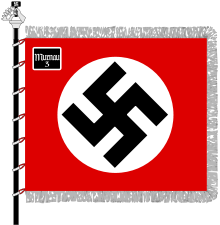- National Socialist Factory Cell Organization
-
The Nationalsozialistische Betriebszellenorganisation (National Socialist Factory Cell Organization) was a workers organization in Nazi Germany.
In 1927, some NSDAP workers in large factories, located mostly in the Berlin area, joined together as an alternative to democratic and Christian labor unions. The NSBO was established in 1928 by these groups.[1]
On January 15, 1931 the NSBO was declared a "Reichsbetriebszellenabteilung" (German Reich Factory Cell Organization) of the Nazi Party. It began to increase its membership by means of aggressive campaigns, which included both propaganda and violence, under the war-cry: "Hinein in die Betriebe!" (Into the Factories!), which was shortened to "Hib".[2]
The NSBO had overall little success among German organized workers, except in certain regions where they supported strikes, such as the transport strike in Berlin. As a result of the "Hib" campaign, the NSBO increased its membership to only about 300.000 by the end of 1931, while the Democratic and Christian labor unions had still well over 5 million members.[3]
Some sections of the NSBO had an ideology similar to National Bolshevism. They believed that after the "national revolution" occurred, a "social revolution" had to follow, to do away with the existing elites.[4] This attitude earned them sympathies in some places, like in Nordhorn, a textile industrial city in the county of Bentheim, where the NSBO defeated the formerly strong Communist labor unions in the industrial worker council elections in 1933.[5] The NSBO's methods then included using armed violence in order to offset a salary reduction in a particular factory.[6]
After all non-Nazi trade unions were oulawed by decree on the May 2, 1933, the NSBO became the only official workers organization in Germany. This moment of glory, however, was short, for the German Labour Front (DAF) was established a few days later. More organized and better represented at national level, the DAF ended up absorbing the NSBO in 1935.[7]
References
- ^ Reinhard Kühnl, Die nationalsozialistische Linke 1925-1930, Marburger Abhandlungen zur Politischen Wissenschaft Vol. 6, Meisenheim am Glan 1966.
- ^ Reinhard Giersch, Nationalsozialistische Betriebszellen-Organisation (NSBO) 1930 (1931)-1934 (1935), in Fricke, Dieter (Hrsg.), Lexikon zur Parteiengeschichte. Die bürgerlichen und kleinbürgerlichen Parteien und Verbände in Deutschland (1789-1945), Vol. 3, Leipzig 1985, Pages 454-459.
- ^ Volker Kratzenberg, Arbeiter auf dem Weg zu Hitler? Die Nationalsozialistische Betriebszellen-Organisation. Ihre Entstehung, ihre Programmatik, ihr Scheitern 1927-1934, Frankfurt/Bern/New York 1987.
- ^ Louis Dupeux, „Nationalbolschewismus“ in Deutschland 1919-1933. Kommunistische Strategie und konservative Dynamik, München 1985.
- ^ Werner Rohr, Nationalbolschewistische Tendenzen in der Nordhorner NSDAP, Bentheimer Jahrbuch 1987, Bad Bentheim 1987, Pages 107-112.
- ^ Helmut Lensing, Die Nationalsozialistische Betriebszellen-Organisation und die NS-Machtergreifung in der Grafschaft Bentheim, Bentheimer Jahrbuch 1993 (= Das Bentheimer Land Vol 125), Bad Bentheim 1992, Pages 167-194.
- ^ Gunther Mai, Die Nationalsozialistische Betriebszellen-Organisation. Zum Verhältnis von Arbeiterschaft und Nationalsozialismus, VfZG 31. Jg. 1983, Pages 573-613.
- This article incorporates information from the equivalent article on the German Wikipedia.
- Lore Heer-Kleinert, Die Gewerkschaftspolitik der KPD in der Weimarer Republik, Frankfurt/New York 1983.
Categories:- Trade unions in Germany
- 1928 establishments in Germany
- Nazi organizations
- 1935 disestablishments
- Organizations established in 1928
- Economy of Nazi Germany
Wikimedia Foundation. 2010.

